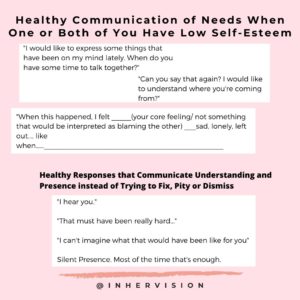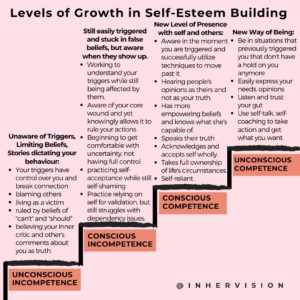Healthy Communication and Low Self-Esteem
Last week we talked about how low self-esteem can actually be sabotaging your relationships, sometimes without you even realizing it. If you haven’t read last week’s post you might want to read it first as I’ve shed some light on what low self-esteem tendencies look like in your relationships.
A big part of your relationships is how you relate to one another. Looking at the longer relationships in your life currently, how do you feel about those people today? Is there any lingering resentment? If there is, it was probably from an explosive conversation where nasty things were said that cannot be taken back; or where certain actions affected the other person’s experience of them.
When dealing with our low self-esteem, we don’t want to build lingering resentment for another because they didn’t treat us right, didn’t listen to our needs, weren’t the person we needed them to be in that relationship, or because they left us.
Because the truth of the matter is: no one owes you anything.
Read that again.
You are solely responsible for your needs and your happiness. Friends, parents and partners you will want to be as much of what you need them to be because they love you, but they are not responsible for your happiness.
Today, we’re going to look at ways you can bypass the angry or jealousy conversations in your relationships and instead keep intimacy and connection open. This requires two people who are willing to be real and to listen open-heartedly to one another. Not everyone will be ready for this. Some people find it too uncomfortable to have these real conversations as it’s just too triggering. So whether you’re having this conversation with a partner, a parent, a best friend, or a potential new partner that you’re dating, make sure you ask permission or at least prep them for the conversation that’s ahead before you dive in. Otherwise what can happen is they become defensive and may translate this conversation as criticism and shaming of what they’re doing wrong, which only pushes you further apart.
How to Communicate Your Needs to your Partner in a Healthy Manner:
Conversations about your needs amd about what triggers you must be delivered in a non-judgemental way. This can be tricky when you’ve never been trained to speak this way. The trick is to focus on expressing your personal experience of the situation and how it’s making you feel about yourself in that moment and not about what they are doing wrong. Refrain from using dialogue that gives the message of blame.
For example,
I felt angry because you left me out and I had to hear it from someone else.
I feel sad because I’m not important to you.
Yes, you probably did feel angry or sad. You probably did feel as if you were left out or forgotten / unimportant. But you must be careful to not fall into a story of what you think is happening, versus what is really happening. We tend to see situations occur through the lens of our own childhood wounding. So if your childhood had dominant memories of you feeling constantly left out, then you may see situations in your adulthood to be constantly left out too.
When speaking to your friend, parent, or partner one of the lines above, you can imagine if you were in their shoes and having someone say this to you, that you may react defensively.
Let’s take a look at some ways we can communicate openly:

Boost Your Self-Esteem Right Now
Having solid esteem is not something you can just build overnight. Like any great skill, it takes years of honing, tweaking and practising new thoughts, behaviors and actions until it becomes a natural way of being.
Think about the last skillset you mastered, whether that was learning how to salsa dance, throw a pot out of clay, write up a business plan, communicate your feelings to your partner… All of these skills occurred in stages of learning:

The image above is an overview of years of working and building one’s self-esteem. Even though self-esteem is a practise, there is something you can start implementing today and that is to adopt these three mindset shifts:
1. I Am Self-Reliant.
Shifting the weight from leaning on another to leaning on yourself– especially emotionally. This can be a hard one because when you struggle with low self-esteem, a lot of where you get your esteem is from other people (their encouragement, validation, affirmation). The next time you recognize that you’re looking up to someone for advice, pause and stay in this space of uncertainty and need to contact others. Give it 30 minutes. Give it one day. Refrain from going to someone else to cheer you up or give you directions on what to do and challenge yourself to figure it out. This WILL feel uncomfortable because it’s not your usual behavior. It’s new and your brain is confused. The more you practise leaning into YOU, the stronger this new behavior becomes and eventually it will become your default.
2. I Take Responsibility For My Life.
Taking full responsibility for yourself is one of life’s greatest lessons. In your past you may have endured a lot of difficulty. You most likely didn’t get all your needs met. There are most likely some lingering childhood stories that upset you still to this day. However, you cannot go back in time and rewrite the past. What IS in your control is deciding how you show up to life today, despite your past experiences. It’s about taking responsibility for your mindset and for your actions in order to give you the circumstances that will bring you happiness. How do you view your world? Are you looking at it through the lens of a victim? Or through the lens of a person with a story? Secondly, people who have not taken responsibility for themselves are quick to blame others when something in their life goes wrong. It’s like a first impulse. It also shows up as having excuses for everything when they don’t show up on time or don’t complete something on time. Are you willing to take responsibility for keeping your word to others and to yourself? When you show up with integrity, others look up to you and trust you; even more importantly, you begin to trust yourself.
3. The More I Give Love, the More Love Is Given to Me.
Most of us are used to showing up in relationships with the mindset of “what can you give me?/ What can I get from you?” instead of “What can I give you? How can I love you?” If you are longing for love, the best way to get that love is to give it. When you give love to another, you feel love. You can’t help but feel connected and on purpose when you’re giving loving actions. Secondly, this gets your mind out of old thinking of neediness and scarcity because you’re now focused on what the other person needs. Try it out. The more you give, the more connected you feel, and the higher your self-esteem will become in the process.
One’s low self-esteem can not only sabotage any relationship, but it can seriously deter you from ever going after the life you’ve dreamed. It can literally stunt you in place for years, if not a lifetime. The first step to creating a healthy relationship is nurturing and building a loving relationship with yourself. Start with the first mindset shift and bring action to it until it’s become a new way of being. Then integrate the second mindset, then the third. Eventually you’ll see that you’re a whole new person ready for a deeper, more connected relationship with another.
PS. If you’re looking to dive deeper into building your self-esteem from the inside out, you might be interested in an exclusive Guide to Building Unwavering Self-Esteem Workbook (being released soon!). It’s a downloadable workbook that guides you in building a solid self-esteem foundation so you can have the relationships you want and the life you’ve always dreamed of.
